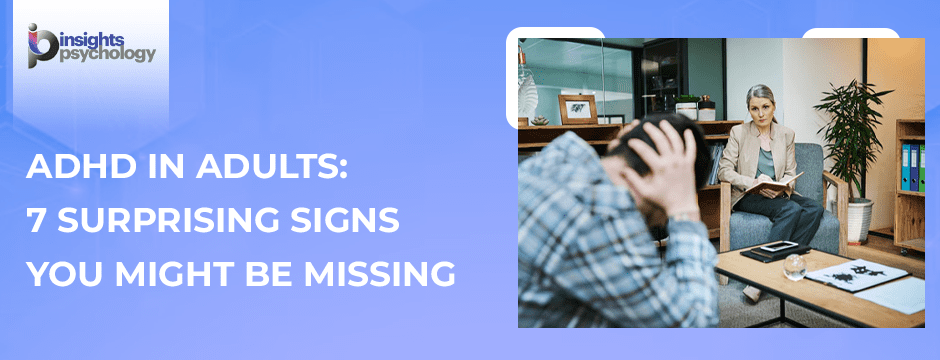When we think of ADHD, most of us picture a restless kid in the back of a classroom—fidgeting, blurting things out, unable to sit still. But ADHD doesn’t magically disappear when we grow up. It just changes how it shows up.
In fact, for many adults, ADHD doesn’t look like hyperactivity at all. It looks like forgetting appointments, starting projects you never finish, struggling to manage emotions, and wondering why life feels harder than it should.
At Insights Psychology, we’ve worked with countless clients who came in thinking they were just “bad at adulting,” only to discover they’d been living with undiagnosed ADHD for years. And the relief they feel after finally getting answers? It’s life-changing.
So today, we’re pulling back the curtain on 7 lesser-known signs of adult ADHD—the kind most people miss or misinterpret. If you recognize yourself in any of these, you’re not alone. And there’s real help available.
1. You're Always Running Late—Even When You Plan Ahead
You set your alarm early. You meant to leave on time. But somehow, you’re rushing out the door with one shoe on, coffee in hand, heart pounding.
This isn’t just poor time management. It’s something called time blindness, and it’s incredibly common in adults with ADHD. Your brain doesn’t naturally track time the way others do. Ten minutes can feel like thirty seconds—or vice versa.
It’s frustrating. You care. You try. But no matter how hard you plan, time seems to slip away.
Try this: Visual timers, alarms, and breaking your schedule into small, manageable chunks can help anchor your day. A psychologist can work with you to find tools that actually work for your brain.
2. You Can Focus… Just Not on What You’re Supposed To
Ever sit down to reply to one email, only to end up deep-diving into YouTube videos about octopuses, ancient Rome, or kitchen gadgets? Two hours gone, inbox untouched.
This isn’t a lack of focus—it’s hyperfocus, and it’s another side of ADHD that’s easy to miss. You can zone in too deeply on the wrong thing, often losing track of time, priorities, or your surroundings.
It feels great in the moment—until the guilt creeps in.
Here’s the truth: ADHD brains crave stimulation. That’s why the boring, routine stuff feels almost painful to get through. Working with a therapist who understands ADHD can help you harness your focus rather than fight against it.
3. You Interrupt People—Even When You Don’t Mean To
Someone’s talking, and halfway through, you jump in. You don’t want to be rude. You just have to say it before the thought disappears.
This kind of impulsivity isn’t about bad manners. It’s neurological. Adults with ADHD often struggle with verbal control—not because they don’t care, but because their brains are moving fast, and it’s hard to hit pause.
Over time, this can strain relationships, especially at work or in close friendships.
Small change, big impact: Pausing, jotting thoughts down, or using gentle reminders in therapy can help slow that conversational impulse—without dimming your spark.
4. You’re Always Losing Things—Even Important Ones
Your phone. Your wallet. That important document you just had in your hand five minutes ago. It’s gone. Again.
It’s not carelessness. It’s part of what psychologists call executive dysfunction—your brain’s “organizing system” is out of sync.
The result? You waste energy on constant damage control. And you may even beat yourself up over it. It’s exhausting.
What helps: External structures. That could be labeled bins, a “launch pad” by the door for essentials, or working with a therapist to create systems that actually stick.
5. Your Emotions Feel… Too Big
You cry at commercials. A small bit of criticism ruins your day. Or you snap over things that wouldn’t faze anyone else. Then afterward, you feel embarrassed—or worse, ashamed.
This isn’t being “too sensitive.” It’s called emotional dysregulation, and it’s a very real, often overlooked part of adult ADHD.
On the flip side, you might shut emotions down completely just to function. Either way, you’re not broken. Your nervous system is just working overtime.
The good news? Therapy can help you understand your emotional patterns—and teach you how to respond, not react.
6. You’re Always Mentally Tired, Even After Rest
You get enough sleep, but by mid-morning, your brain feels foggy. You can’t think straight. Everything feels like a mental marathon.
That’s because ADHD doesn’t just affect attention—it also drains mental energy. Constantly redirecting your thoughts, fighting distraction, masking symptoms, and just trying to keep up takes a serious toll.
You’re not imagining it. This kind of burnout is real.
Recovery starts with awareness: Identifying your personal energy patterns and setting realistic limits (with professional support) can prevent total wipeout—and help you thrive instead of just survive.
7. You Feel Like You’re Always Falling Short—Even When You’re Not
You hit deadlines. You show up. You’re functioning. But under the surface? You feel like a mess. Like you’re barely holding it together. Like you’re one misstep away from everything falling apart.
This is the silent weight of undiagnosed ADHD: years of internalized shame from being misunderstood, misjudged, or constantly told you’re “too much” or “not enough.”
So many adults blame themselves before they ever think to explore ADHD as a possibility.
Here’s what we want you to hear:
This isn’t about labels. It’s about understanding how your brain works—and finally giving yourself the compassion and support you deserve.
You Deserve Real Answers. And Better Tools.
If any of this sounds painfully familiar, we want to say something clearly:
You are not lazy. You are not broken. You are not alone.
At Insights Psychology, we specialize in helping adults uncover what’s really going on beneath the surface. Whether it’s a full ADHD assessment, personalized therapy, or just a safe space to explore your patterns—we’re here to help you feel seen, heard, and equipped.
Take the First Step: Book Your ADHD Consultation Today
There’s no pressure. Just clarity.
Or call us if you’d rather talk it through—we’re real people on the other end.
Your life doesn’t have to feel this hard.
Let’s figure it out—together.
Final Thought: It’s Not Too Late to Understand Yourself
Adult ADHD doesn’t look like it does in the movies. It often hides behind coping strategies, exhaustion, perfectionism, or self-doubt.
But once you start seeing it for what it is, the pieces begin to click. The shame softens. And your potential comes into focus—clearly and powerfully.
Whether you’re a creative thinker, a multitasking parent, a burnt-out executive, or just someone who feels off and doesn’t know why… You deserve a life that fits the way your mind works.
Let’s build that life—with insight, support, and tools that actually work.
We’re ready when you are.
Understanding and Managing ADHD in Adults: Key FAQs Answered
1. What are signs of ADHD in adulthood?
ADHD in adults symptoms may include persistent inattention, disorganization, impulsiveness, difficulty prioritizing tasks, and forgetfulness. Adults may struggle with time management, meeting deadlines, or following through on responsibilities. Emotional signs like frustration, mood swings, or low tolerance for stress are also common. If these symptoms interfere with daily life or work, consulting a psychiatrist for ADHD in adults or a licensed psychologist for ADHD in adults can help with diagnosis and care.
2. How do you treat ADHD in adults?
Adults with ADHD are frequently treated with a mix of medication and counseling. Stimulant medications are commonly prescribed, but behavioral strategies are just as important. Many benefit from behavioral therapy for ADHD in adults, which helps develop structure, manage impulses, and improve focus. Working with a psychiatrist for ADHD in adults ensures proper medication management, while a psychologist for ADHD in adults can support long-term coping skills and lifestyle changes.
3. What is the 24 hour rule for ADHD?
The “24-hour rule” is a self-management strategy used by some adults with ADHD to delay impulsive decisions. When tempted to make a sudden choice—like a major purchase—they give themselves 24 hours to reconsider. This makes it easier in controlling impulsivity, a frequent characteristic of ADHD in adults. While not a formal medical guideline, it can be an effective behavioral tool alongside professional ADHD in adults treatment and therapy.
4. Can a person with ADHD live a normal life?
Yes, people with ADHD may lead successful, satisfying lives if they receive the right help. Identifying ADHD in adults symptoms early and receiving appropriate ADHD in adults treatment—including medication, behavioral therapy for ADHD in adults, and coaching—can make a significant difference. A qualified psychiatrist or psychologist for ADHD in adults can help tailor a plan that strengthens daily functioning, improves relationships, and enhances well-being over time.
5. How serious is ADHD in adults?
ADHD in adults can significantly affect work, relationships, and emotional health if left untreated. Chronic disorganization, impulsivity, and inattentiveness are common ADHD in adults symptoms that may lead to frustration or low self-esteem. However, with effective ADHD in adults treatment—such as medication, behavioral therapy, and guidance from a psychologist or psychiatrist for ADHD in adults—the condition can be well-managed, enabling a stable and productive lifestyle.
Curious about how remote care can support ADHD treatment too? Explore the transformation happening through virtual therapy.

